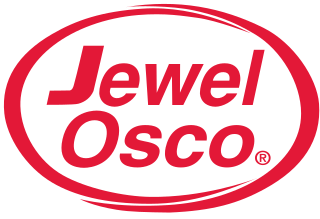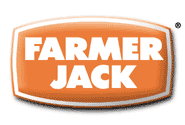Related Research Articles

Jewel-Osco is a regional supermarket chain in the Chicago metropolitan area, headquartered in Itasca, a western suburb. In 2007, the company had 188 stores across northern, central, and western Illinois; eastern Iowa; and portions of northwest Indiana. Jewel-Osco has been a wholly owned subsidiary of Boise-based Albertsons since 1999. The company originally started as a door-to-door coffee delivery service before it expanded into delivering non-perishable groceries and later into grocery stores, and supermarkets. Prior to its 1984 acquisition by American Stores, Jewel evolved into a large multi-state holding company that operated several supermarket chains and other non-food retail chain stores located from coast to coast and had operated under several different brand names.
Dominion was a national chain of supermarkets in Canada, which was known as the Dominion of Canada when the chain was founded. The chain was founded in 1919 in Ontario and was later acquired by the Argus Corporation. It was later sold to The Great Atlantic & Pacific Tea Company (A&P), which restricted the chain to the Greater Toronto Area. Stores outside Ontario were converted to the A&P banner or sold to third parties. A&P's Canadian division was later acquired by Metro Inc., which rebranded the remaining Dominion stores to its namesake banner in 2008.

The Kroger Company, or simply Kroger, is an American retail company that operates supermarkets and multi-department stores throughout the United States.
A discount store or discounter offers a retail format in which products are sold at prices that are in principle lower than an actual or supposed "full retail price". Discounters rely on bulk purchasing and efficient distribution to keep down costs.

Meijer Inc. is an American supercenter chain that primarily operates throughout the Midwestern United States. Its corporate headquarters are in Walker, Michigan, which is a part of the Grand Rapids metropolitan area. Founded in 1934 as a supermarket chain, Meijer is credited with pioneering the modern supercenter concept in 1962. About half of the company's 259 stores are located in Michigan; the others are in Illinois, Indiana, Kentucky, Ohio, and Wisconsin. The chain is ranked by Forbes as the 14th-largest private company in the United States, and is the country's 21st-largest retailer by revenue as of 2020.

Farmer Jack was a supermarket chain based in Detroit, Michigan. At its peak, it operated more than 100 stores, primarily in metropolitan Detroit. In its final years, the chain operated as the Midwest subsidiary of the New Jersey-based A&P Corporation. A&P closed the Farmer Jack chain on July 7, 2007.
SpartanNash is an American food distributor and grocery store retailer headquartered in Byron Center, Michigan. The company's core businesses include distributing food to independent grocers, military commissaries, and corporate-owned retail stores in 44 states, Europe, Latin America, and the Middle East. SpartanNash operates 142 corporate-owned retail stores under a number of brands located in North Dakota, South Dakota, Nebraska, Minnesota, Iowa, Indiana, Wisconsin, Michigan, and Ohio, many of which were local grocery chains acquired by SpartanNash. In terms of revenue, it is the largest food distributor serving military commissaries and exchanges in the United States. It is known for its Our Family line of products and formerly the "Spartan" line of products.

Bottom Dollar Food was an American soft-discount grocery chain. It was a subsidiary of Delhaize America, the U.S. division of international food retailer Delhaize Group. Its headquarters was in Salisbury, North Carolina.

Genesee Valley Center is an enclosed shopping mall located in Flint Township, Michigan, outside the city of Flint, Michigan, United States. Opened in 1970, the mall is 1,272,397 square feet (118,209.5 m2) of leasable area. The mall has three anchor tenants: JCPenney, Macy's, and Play Big. It comprises more than 120 tenants, including a food court, and an external concourse called the Outdoor Village which also features a Barnes & Noble bookstore. The mall is located on Miller Road and Linden Road, near the junction of Interstate 69 (I-69) and I-75.

Food Fair, also known by its successor name Pantry Pride, was a large supermarket chain in the United States. It was founded by Samuel N. Friedland, and his brother George I. Friedland who opened the first store in Harrisburg, Pennsylvania, in the late 1920s. As of 1957, Food Fair had 275 stores, and at its peak, the chain had more than 500 stores. Friedland's family retained control of the firm through 1978, when the chain entered bankruptcy.

Kohl’s Food Stores was a Milwaukee-area grocery store chain and subsidiary of The Great Atlantic and Pacific Tea Company. Kohl’s Food Stores distribution center was located in Waukesha, while its management offices were located in Milwaukee, Wisconsin.

Hartfield-Zodys was an American retail corporation begun in 1960. It operated the Hartfield chain of women's ready-to-wear apparel in the Los Angeles area, and starting in 1960, the Zodys chain of discount retail stores (1960–1986), which operated locations in California, Arizona, Nevada, New Mexico, and Michigan.

The J.W. Knapp Company, more commonly known as "Knapp's", was a chain of department stores based in Lansing, Michigan.

Chatham was a supermarket chain, now-defunct, headquartered in southeastern Michigan, United States. Founded by Royal Supermarkets in the mid-1950s, Chatham was often compared to Kroger in size and selection. Typical of many grocery stores of its time, Chatham was unable to keep up with big-box grocery competitors, including Michigan-based Meijer. Kroger subsequently purchased former Chatham locations after the chain went out of business.
Kessel Food Markets was an American supermarket chain based in Michigan. It began in 1981 when Owosso, Michigan, native Al Kessel, a former executive vice president of Hamady Brothers supermarkets, purchased Kroger locations in Corunna and Saginaw. Kroger closed these stores due to Michigan's poor economy at the time, and failure to reach union agreements. After Kroger closed all five of its Flint locations in 1982 for the same reasons, Kessel purchased them as well, followed by 13 Hamady stores after that chain filed for bankruptcy in 1991. At its peak, Kessel Food Markets comprised 24 stores. Kessel filmed his own television commercials for the chain, in which he would throw items into a grocery cart and state, "Save at Kessel this week. Why? Because we're with you."
Hamady was an American supermarket chain based in Flint, Michigan, United States, which at its peak had 37 stores and 1,300 employees. Given the chain's pervasiveness in the area, paper grocery bags were known as “Hamady sacks”.

Dawn Donuts is a doughnut chain begun in Jackson, Michigan. Although most of the chain was sold to Dunkin' Donuts in 1991, the bakery for the company's donuts remains operational, as do two locations in the Flint area.
Shoppers Fair was an American discount department store chain. It was founded in 1956 in Bridgeport, Connecticut and owned by New York City-based Mangel, but primarily operated in the state of Michigan. The chain closed the last of its stores in 1975.
References
- 1 2 3 "Hamady Sacks and Yankee Hats". 20 February 2004. Retrieved 2014-02-21.
- ↑ "Large Yankee Store To Be Built on M-21". Owosso Argus-Press . 30 April 1962. p. 1. Retrieved 2014-02-21.
- ↑ "8 more Yankee stores sold". Detroit Free Press . December 23, 1971. p. 3B. Retrieved 14 March 2018.
- ↑ The Food Institute's Weekly Digest. Vol. 79. American Institute of Food Distribution. 1972. p. 210. Retrieved 2014-02-21.
- ↑ "Yankee Stores Transferred". Owosso Argus-Press. 21 February 1972. p. 16. Retrieved 2014-02-21.
- ↑ Passic, Frank (21 October 2001). "Yankee Store". Albion Morning Star. City of Albion, Michigan. p. 19. Retrieved 2014-02-21.